Philip James Corso | |
|---|---|
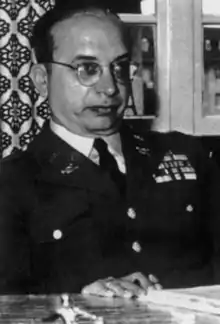 | |
| Born | May 22, 1915 California, Pennsylvania |
| Died | July 16, 1998 (aged 83) Jupiter, Florida |
| Place of burial | |
| Allegiance | United States |
| Service/ | United States Army |
| Years of service | February 23, 1942 – March 1, 1963 |
| Rank | Lieutenant Colonel |
| Commands held | Battalion Commander of European Air Defense Intel Staff Officer Plans & Estimate Branch GHQ Far East Command Chief Special Project Branch G-2 Section of the HQ AFFE 8000th AU Command Chief Foreign Technology Division of the United States Department of Defense Staff Officer in the Plans Division OCRD Washington DC, Fort Riley |
| Battles/wars | World War II Korean War |
| Awards | Legion of Merit Army Commendation Medal Bronze Star American Campaign Medal American Defense Service Medal European–African–Middle Eastern Campaign Medal World War II Victory Medal |
Philip James Corso (May 22, 1915 – July 16, 1998) was an American Army officer.
He served in the United States Army from February 23, 1942, to March 1, 1963,[1] and earned the rank of lieutenant colonel.
Corso published The Day After Roswell in 1997, about his alleged involvement in the research of extraterrestrial technology recovered from the 1947 Roswell Incident.
On July 23, 1997, he was a guest on the popular late-night radio show, Coast to Coast AM with Art Bell where he spoke live about his Roswell story.[2]
Biography
Military career
After joining the Army in 1942, Corso served in Army Intelligence in Europe, becoming chief of the US Counter Intelligence Corps in Rome.
In 1945, Corso arranged for the safe passage of 10,000 Jewish World War II refugees out of Rome to the British Mandate of Palestine. He was the personal emissary to Giovanni Battista Montini at the Vatican, later Pope Paul VI, during the period when the "Nazi Rat Lines" were most active.
During the Korean War (1950–1953), Corso performed intelligence duties under General Douglas MacArthur as Chief of the Special Projects branch of the Intelligence Division, Far East Command. One of his primary duties was to keep track of enemy prisoner of war (POW) camps in North Korea.[3] Corso was in charge of investigating the estimated number of U.S. and other United Nations POWs held at each camp and their treatment.
At later hearings in 1992 of the Senate Select Committee on POW/MIA Affairs, Corso testified that he believed hundreds of American POWs were abandoned at these camps.[4][5] Committee member John McCain stated that his knowledge obtained from those who had personal relationships with Eisenhower led him to believe that Eisenhower was just not capable of allowing known American POWs to remain incarcerated after the termination of the Korean War.
Corso was on the staff of President Eisenhower's National Security Council for four years (1953–1957).
In 1961, he became Chief of the Pentagon's Foreign Technology desk in Army Research and Development, working under Lt. Gen. Arthur Trudeau.
The Day After Roswell
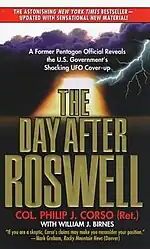
In his book The Day After Roswell (co-author William J. Birnes), Corso claims he stewarded extraterrestrial artifacts recovered from a crash near Roswell, New Mexico, in 1947.
Corso says a covert government group was assembled under the leadership of Adm. Roscoe H. Hillenkoetter, the first director of Central Intelligence (see Majestic 12). Among its tasks was to collect all information on off-planet technology. The US administration simultaneously discounted the existence of flying saucers in the eyes of the public, Corso says.
According to Corso, the reverse engineering of these artifacts indirectly led to the development of accelerated particle beam devices, fiber optics, lasers, integrated circuit chips and Kevlar material.
In the book, Corso claims the Strategic Defense Initiative (SDI), or "Star Wars", was meant to achieve the destructive capacity of electronic guidance systems in incoming enemy warheads, as well as the disabling of enemy spacecraft, including those of extraterrestrial origin.
Death
Gallery
Personal
Files
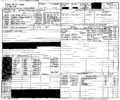 DA Form 66 (page 1)
DA Form 66 (page 1)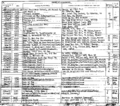 DA Form 66 (page 2)
DA Form 66 (page 2)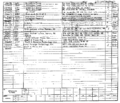 DA Form 66 (page 3)
DA Form 66 (page 3) DA Form 66 (page 4)
DA Form 66 (page 4) DA Form 66 (page 5)
DA Form 66 (page 5)
His service number on his id card was 01047930 as shown on TV.
See also
References
- ↑ "Philip J. Corso's Department of the Army Form 66, Officer Qualification Record". Retrieved February 10, 2007.
- ↑ "Colonel Phil Corso". Archived from the original on March 13, 2019. Retrieved May 18, 2018.
- ↑ "House Subcommittee on Military Personnel, Statement of Colonel {ret.} Phillip Corso". September 17, 1996. Archived from the original on May 13, 2008. Retrieved May 15, 2009.
- ↑ "Testimony Of Dolores Alfond Before The Pennsylvania Legislature". May 3, 1999. Archived from the original on December 11, 2006. Retrieved February 9, 2007.
- ↑ "Senate Select Committee 49". AII POW-MIA. November 11, 1992. Archived from the original on November 3, 2006. Retrieved February 10, 2007.
- ↑ "Colonel Phil Corso". Archived from the original on March 13, 2019. Retrieved May 18, 2018.
- ↑ "Corso Passes Away".
Further reading
- W. Nelan, Bruce (September 30, 1996). "Lost Prisoners Of War: "Sold Down The River"?". Time. Archived from the original on September 30, 2007. Retrieved May 5, 2007.
- Huyghe, Patrick (March 20, 2000). "Taking the UFO Case to Court". Space.com. Retrieved May 5, 2007.
- Philip J. Corso; William J. Birnes (1997). The Day After Roswell. Pocket Books. ISBN 978-0-671-01756-9.
External links
- Obituary at Legacy.com
- Appearances on C-SPAN
- Philip J. Corso at IMDb
- Biography at UFOs.com
- Biography at Coast to Coast AM
- Interview with Philip J. Corso and William J. Birnes Archived April 22, 2008, at the Wayback Machine at Coast to Coast AM
- (Updated) Philip J. Corso Voice Stress Analysis reveals no deception
- Holmes, Steven A. (Nov. 11, 1992). "Hearings Opened on Korea M.I.A.'s." New York Times.
- Space Weapons as Defense – Nexus Magazine vol 13:2 – Michael E. Salla Ph.D
- The Korean War – Tackling the Tough Topics Issue #63 – Darryl Eberhart
- Phillip Corso Jr. talking about aliens and ufos
Videos
- Disclosure Project – Extraterrestrial Contact and Close Encounter: Part 2 – 2001
- Dateline (NBC) – Claims of Close Encounters and Cover Ups on YouTube – 1997
- Coast to Coast AM – Radio Interview with Art Bell on YouTube – July 23, 1997


